The HyperTexts
"Auschwitz Rose" and other Holocaust Poems by Michael R. Burch
Michael R. Burch is an
American editor, translator and publisher of Holocaust poetry. The "Auschwitz Rose" painting
immediately below is by Mary Rae.
Burch describes the painting's genesis as follows: "The Rose came to me in a
vision, and Mary Rae helped bring her to life. In my vision the Rose floated in
the air, suspended before the dismal gray Auschwitz death camp. Thornless, she
symbolizes women and children who are defenseless unless we choose to protect
them." (The poems on this page can be distributed freely, as long as Michael R.
Burch's
name appears with his poems; Mary Rae should be credited if the
image is copied or used in any way. Please do not use the poem or image for
commercial purposes, respecting the sacredness of the subject. We welcome the
use of the material on this page in Holocaust studies, classes, discussions, articles,
memorials and remembrances.)
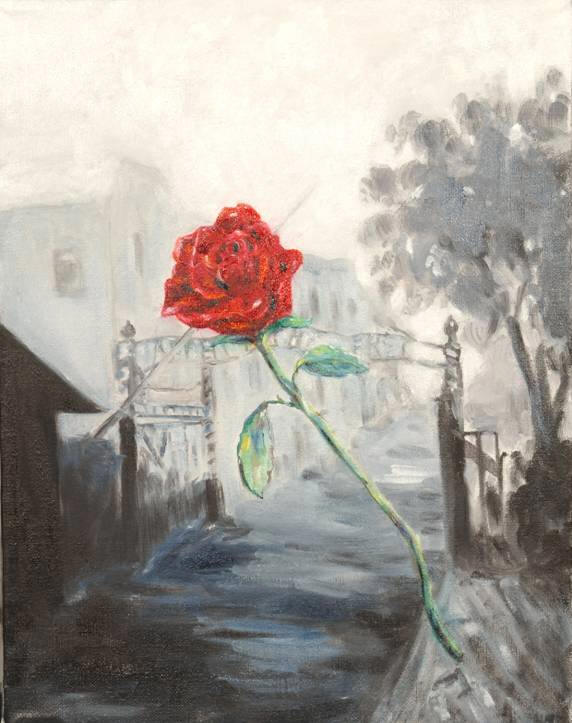
Auschwitz Rose
by Michael R. Burch
There is a Rose at Auschwitz, in the briar,
a rose like Sharon's, lovely as her name.
The world forgot her, and is not the same.
I revere her and enlist this sacred fire
to keep her memory exalted flame
unmolested by the thistles and the nettles.
On Auschwitz now the reddening sunset settles!
They sleep alike—diminutive and tall,
the innocent, the "surgeons."
Sleeping, all.
Red oxides of her blood, bright crimson petals,
if accidents of coloration, gall
my heart no less.
Amid thick weeds and muck
there lies a rose man's crackling lightning struck:
the only Rose I ever longed to pluck.
Soon I'll bed there and bid the world "Good Luck."
Published by Voices Israel, Other Voices International, Verse Weekly, Black
Medina, Promosaik, FreeXpression (Australia), Litera (UK),
Yahoo Buzz, de Volksrant Blog (Holland), Sonnetto Poesia (Canada),
Trinacria, Pennsylvania Review, and a number of other literary journals
and websites
If you are a student, teacher, educator, peace activist or just someone who cares and wants to help, please read
How Can We End Holocausts, Ethnic Cleansing and
Genocide Forever? then do what you can to make the world a safer, happier place for children of all races and creeds.
Frail Envelope of Flesh
by Michael R. Burch
for the mothers and children of the Holocaust
Frail envelope of flesh,
lying cold on the surgeon’s table
with anguished eyes
like your mother’s eyes
and a heartbeat weak, unstable ...
Frail crucible of dust,
brief flower come to this—
your tiny hand
in your mother’s hand
for a last bewildered kiss ...
Brief mayfly of a child,
to live two artless years!
Now your mother’s lips
seal up your lips
from the Deluge of her tears ...
Published by The Lyric, Promosaik (Germany), Setu (India) and
Poetry Life & Times; translated into Arabic by Nizar Sartawi and into
Italian by Mario Rigli
When we consider man's inhumanity to man, few images are as stark as that of
Nazi "surgeons" conducting horrific experiments on innocent children.
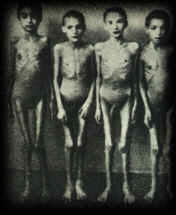
Something
by Michael R. Burch
for the children of the Holocaust
Something inescapable is lost—
lost like a pale vapor curling up into shafts of moonlight,
vanishing in a gust of wind toward an expanse of stars
immeasurable and void.
Something uncapturable is gone—
gone with the spent leaves and illuminations of autumn,
scattered into a haze with the faint rustle of parched grass
and remembrance.
Something unforgettable is past—
blown from a glimmer into nothingness, or less,
which denial has swept into a corner, where it lies
in dust and cobwebs and silence.
Published by There is Something in the Autumn (anthology), The
Eclectic Muse (Canada), Setu (India), FreeXpression
(Australia), Life and Legends, Poetry Super Highway, Poet’s Corner,
Promosaik (Germany), Better Than Starbucks and The Chained
Muse; also used in numerous Holocaust projects, translated into Romanian by
Petru Dimofte, turned into a YouTube video by Lillian Y. Wong, and used by
Windsor Jewish Community Centre during a candle-lighting ceremony
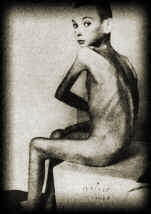
Epitaph for a Child of the Nakba
("Catastrophe")
by Michael R. Burch
I lived as best I could, and then I died.
Be careful where you step: the grave is wide.
Published by Romantics Quarterly, Poetry Super Highway, Mindful of Poetry,
Poets for Humanity, The New Formalist, Angle (Australia), Daily Kos,
Katutura English (Namibia), Genocide Awareness, The Hip Forms, Darfur
Awareness Shabbat, Viewing Genocide in Sudan, Trudantalion Blog, FreeXpression
(Australia), Setu (India), Brief Poems, Better Than Starbucks
and Art Villa; also translated into Romanian by Petru Dimofte, into
Turkish by Nurgül Yayman, into Czech by Z J Pinkava, and into Indonesian by A.
J. Anwar; also set to music by Sloane Simon after the Pittsburgh synagogue
shooting
Pfennig Postcard, Wrong Address
by Michael R. Burch
We saw their pictures:
tortured out of our imaginations
like golems.
We could not believe
in their frail extremities
or their gaunt faces,
pallid as our disbelief.
They are not
with us now ...
We have:
huddled them
into the backroomsofconscience,
consigned them
to the ovensofsilence,
buried them in the mass graves
of circumstancesbeyondourcontrol.
We have
so little left
of them
now
to remind us ...
Originally published in the Holocaust anthology Blood to Remember, then
by Poetry Super Highway, Gostinaya (Russia), Ulita
(Russia), Promosaik (Germany), Lone Stars, GloMag
(India) and by Archbishop Michael Seneco on his Facebook page and personal
website
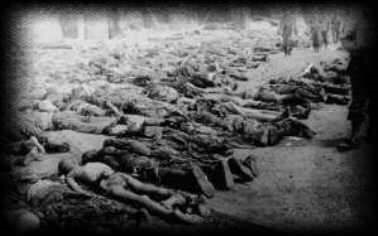
Speechless
by Ko Un
loose translation/interpretation by Michael R. Burch
At Auschwitz
piles of glasses
mountains of shoes
returning, we stared out different windows.
Franta Bass: The Little Boy With His Hands Up
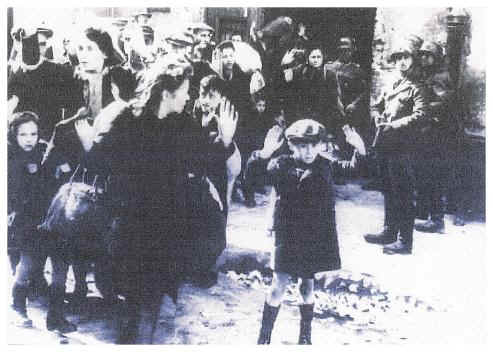
Frantisek “Franta” Bass was a Jewish boy born in Brno, Czechoslovakia in 1930. When he was just eleven years old, his family was deported by the Nazis to Terezin, where the SS had created a hybrid Ghetto/Concentration
Camp just north of Prague (it was also known as Theresienstadt). Franta was one of many little boys and girls who lived there under terrible conditions for three years. He was then sent to Auschwitz, where on October
28th, 1944, he was murdered at age fourteen.
The Garden
by Franta Bass
translation by Michael R. Burch
A small garden,
so fragrant and full of roses!
The path the little boy takes
is guarded by thorns.
A small boy, a sweet boy,
growing like those budding blossoms!
But when the blossoms have bloomed,
the boy will be no more.
Jewish Forever
by Franta Bass
translation by Michael R. Burch
I am a Jew and always will be, forever!
Even if I should starve,
I will never submit!
But I will always fight for my people,
with my honor,
to their credit!
And I will never be ashamed of them;
this is my vow.
I am so very proud of my people now!
How dignified they are, in their grief!
And though I may die, oppressed,
still I will always return to life ...
Postcard 1
by Miklós Radnóti
loose translation/interpretation by
Michael R. Burch
Out of Bulgaria, the great wild roar of the artillery thunders,
resounds on the mountain ridges, rebounds, then ebbs into silence
while here men, beasts, wagons and imagination all steadily increase;
the road whinnies and bucks, neighing; the maned sky gallops;
and you are eternally with me, love, amid all the chaos,
glowing within my conscience — incandescent, intense.
Somewhere within me, dear, you abide forever —
still, motionless, silent, like an angel stunned to complacence by death
or an insect inhabiting the heart of a rotting tree.
Translator's Note: In my opinion, Miklós Radnóti, a Jewish-Hungarian poet, was the
greatest of the Holocaust poets. He called his final poems "postcards." They
were written on his death march and were later discovered in his coat pocket by
his wife. She found his body lying in a mass grave. His poetic postcards are
stark warnings of the very real dangers created by racism, tribalism and
ultra-nationalism.
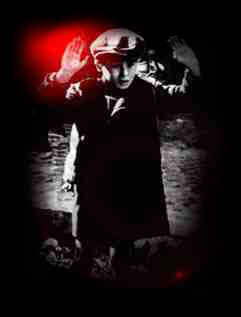
Survivors
by Michael R. Burch
In truth, we do not feel the horror
of the survivors,
but what passes for horror:
a shiver of “empathy.”
We too are “survivors,”
if to survive is to snap back
from the sight of death
like a turtle retracting its neck.
Published by The HyperTexts, Gostinaya (Russia), Ulita
(Russia), Promosaik (Germany), The Night Genre Project and
Muddy Chevy; also turned into a YouTube video by Lillian Y. Wong

Cleansings
by Michael R. Burch
Walk here among the walking specters. Learn
inhuman patience. Flesh can only cleave
to bone this tightly if their hearts believe
that God is good, and never mind the Urn.
A lentil and a bean might plump their skin
with mothers’ bounteous, soft-dimpled fat
(and call it “health”), might quickly build again
the muscles of dead menfolk. Dream, like that,
and call it courage. Cry, and be deceived,
and so endure. Or burn, made wholly pure.
If one prayer is answered,
“G-d”
must be believed.
No holy pyre this—death’s hissing chamber.
Two thousand years ago—a starlit manger,
weird Herod’s cries for vengeance on the meek,
the children slaughtered. Fear, when angels speak,
the prophesies of man.
Do what you "can,"
not what you must, or should.
They call you “good,”
dead eyes devoid of tears; how shall they speak
except in blankness? Fear, then, how they weep.
Escape the gentle clutching stickfolk. Creep
away in shame to retch and flush away
your vomit from their ashes. Learn to pray.
Published by Other Voices International, Promosaik (Germany),
Inspirational Stories, Ulita (Russia), The Neovictorian/Cochlea
and Trinacria
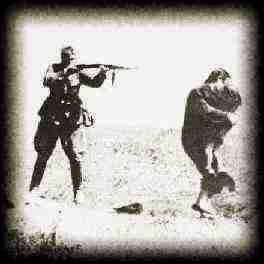
Postcard 4
by Miklós Radnóti
loose translation/interpretation by
Michael R. Burch
I fell beside him — his body taut,
tight as a string just before it snaps,
shot in the back of the head.
"This is how you’ll end too; just lie quietly here,"
I whispered to myself, patience blossoming into death.
"Der springt noch auf," the voice above me said
through caked mud and blood congealing in my ear.
"Der springt noch auf" means something like "That one is still jumping."
Author's Notes
by Michael R. Burch
What was the genesis, the root cause of the Holocaust? The Holocaust became possible when Nazi
Germany denied Jews, Gypsies, Slavs, homosexuals and other human
beings the protection of fair laws and courts. All too often the victims
were completely innocent women and children, even babies. If German courts had
upheld the rights of all people, the Holocaust could
never have taken place. Thus the way to keep such things from ever happening again is simple (which
does not mean "easy"): the world needs to require every nation to establish equal
rights, fair laws and fair courts for all human
beings, without exception.
Allowing exceptions to this simple rule invariably leads to terrible misery, suffering and premature
unjust deaths. Another name for premature unjust deaths is "murder." White settlers once stripped Native Americans of their human rights and
dignity, and soon innocent women and children were walking the Trail of Tears,
and dying.
White slaveowners once stripped African Americans of their human rights and dignity, and
not only did black slaves suffer abomination upon abomination, but it took
a terrible Civil War followed by a century of Jim Crow laws, kangaroo courts and
public lynchings before the United States finally began to embrace its avowed
creed of all men being created equal. Very
similar things happened to Australian aborigines and South African blacks, among
others. Again, each premature unjust death was a murder. If we add all the
horrors together, untold millions of people were murdered. Those murders could
have been prevented by fair laws and fair courts.
These problems are only corrected when nations
finally abandon racism (I call it the "chosen few sin-drome") and establish
equal rights, fair laws and fair courts for everyone. Unfortunately, this is a lesson
Israel needs to learn and take to heart today, because Israel's racist laws and
courts have led to escalating violence on both sides of the
Israeli/Palestinian conflict. A Palestinian baby should not—must
not—be born with inferior rights to a Jewish baby.
When black babies were born with inferior rights to white babies in the United
States, the country was ripped apart, because multitudes of white Americans could not bear to see the misery and suffering of so many black
children. Today there are many Jewish humanitarian organizations and
Jewish individuals who feel the same way about the Palestinians. The existence of
more than 200 Jewish organizations that oppose the abuse of Palestinians
is proof positive that a terrible problem exists. Why are Jews,
Americans and Internationals using their bodies as human shields, to protect
Palestinian women, children and farmers in Gaza and the West Bank? The "proof is
in the pudding," as the saying goes. If the children of one race need human shields
to protect them from the adults of another race, and those adults are wearing
military uniforms, then something is clearly wrong. Things only improved in the
United States when employees of the government stopped persecuting minorities
and started protecting them.
It's time for all Jews of good conscience, all Americans of good conscience,
and all the people of the world to confront the simple facts:
government-sanctioned racism, unjust
laws and unjust courts will always lead to racial violence. Since
1776 human beings have been rightly unwilling to be stripped of their self-evident
human rights, and the Palestinians have every reason to demand equal rights for
themselves. I am an editor, translator and publisher of Holocaust poetry, not an anti-Semite. I
believe in protecting all women and children, and not harming any of them
unjustly. I have
studied History and have listened to the Witnesses who endured the horrors of the
Holocaust, and they tell me that every
human being must be protected by fair laws and courts. If it was wrong for
the Nazis to strip Jews of their human rights during the Shoah (Hebrew for
"Catastrophe"), then it is wrong for Israel to strip Palestinians of their human
rights during the Nakba (Arabic for "Catastrophe"). The Shoah is fortunately
over; the Nakba unfortunately continues. We must all say "Never again!" to all
such atrocities, and never allow a child to be born bereft of equal rights and
the protections of fair laws and courts.
War, the God
by Michael R. Burch
War lifts His massive head and turns ...
The world upon its axis spins.
... His head held low from weight of horns,
His hackles high. The sun He scorns
and seeks the rose not, but its thorns.
The sun must set, as night begins,
while, unrepentant of our sins,
we play His game, until He wins.
For War, our God, our bellicose Mars
still dominates our heavens, determines our Stars.
For an expanded bio, circum vitae and career timeline of the translator, please click
here:
Michael R.
Burch Expanded Bio.
The HyperTexts







